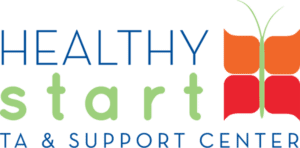The Healthy Start Team
Healthy Start (HS) teams include people in different roles all working together to best serve HS participants and the community. The team usually includes a Project Director, Program Manager(s), Care Coordinators/Case Managers, Community Health Workers, Consortium Coordinator, Program Evaluator, and Fatherhood Coordinator. Teams may also include social workers, nurses, and others.
What Do Healthy Start Teams Do?
While each local HS project is unique and structured to meet the needs of its community, all HS programs share the following characteristics:
HS projects work in partnership with participants, recognizing participants’ strengths as well as their needs, and encouraging and supporting them to take action and advocate for themselves and their families.
Each HS project is required to have a Community Consortium, a group of diverse, multi-sector state, local, and community level partners, including HS participants and other community members. The Consortium 1) Advises and informs strategies for providing direct and enabling services to HS participants; 2) Develop cross-sector partnerships to ensure participants have access to needed services; and 3) Develop and implement a plan for the community that focuses on at least one social determinant of health (SDOH).
HS staff go out into the community to invite women and families to enroll in the program. They go to the places where women and families live, work, and play to recruit participants, and they ask other community organizations to refer potential participants.
HS projects provide services in participant’s homes, in groups, and out in the community.
HS staff ask participants questions using an approved screening tool (i.e.,, questionnaire) to identify the participants’ health risks and needs. They then use that information to develop a care plan to help meet those needs.
HS staff work with participants to connect them to community-based health and social services, programs, and other supports to meet their needs.
HS staff offer information and support to help participants practice healthy behaviors that will improve the health and well-being of themselves and their families. Health education is provided one-on-one and in groups.
